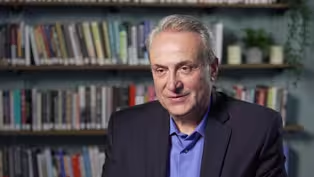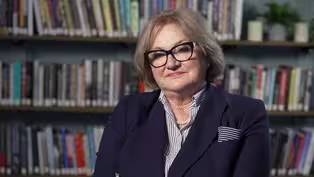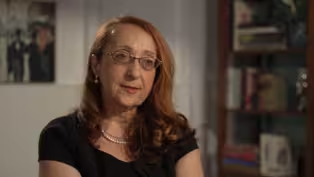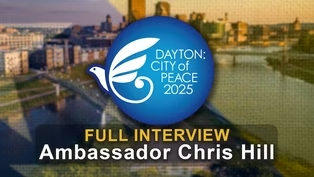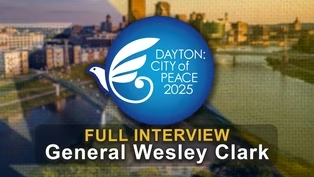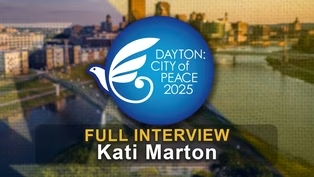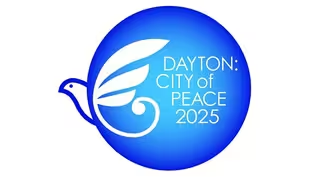
Irena Joseph
Clip: Special | 5m 42sVideo has Closed Captions
Meet Irena, an educator whose journey began in Konjic, Bosnia and Herzegovina.
Meet Irena, an educator whose journey began in Konjic, Bosnia and Herzegovina. After studying in both Bosnia and the U.S., she earned two Master’s degrees and has spent over 15 years teaching English to international students. Now living in Dayton with her family, Irena continues to inspire through her work at the University of Dayton.
Problems playing video? | Closed Captioning Feedback
Problems playing video? | Closed Captioning Feedback
ThinkTV Originals is a local public television program presented by ThinkTV

Irena Joseph
Clip: Special | 5m 42sVideo has Closed Captions
Meet Irena, an educator whose journey began in Konjic, Bosnia and Herzegovina. After studying in both Bosnia and the U.S., she earned two Master’s degrees and has spent over 15 years teaching English to international students. Now living in Dayton with her family, Irena continues to inspire through her work at the University of Dayton.
Problems playing video? | Closed Captioning Feedback
How to Watch ThinkTV Originals
ThinkTV Originals is available to stream on pbs.org and the free PBS App, available on iPhone, Apple TV, Android TV, Android smartphones, Amazon Fire TV, Amazon Fire Tablet, Roku, Samsung Smart TV, and Vizio.
Providing Support for PBS.org
Learn Moreabout PBS online sponsorship(gentle piano music) - I was a teenager back then.
I was living with my family, my parents and younger brother, and my grandmother in a family house.
In spring of 1992, we left in mid-April.
Before then, there were already some problems happening in other cities.
The siege in Sarajevo had already started.
It was pretty clear that the situation wasn't safe anymore.
I remember that time as stressful and uncertain, very uncertain, because every day, we were hoping to hear good news.
Somebody saying, "It's over.
You can go home."
We would watch TV or have radio on all the time, but it didn't, that news never came.
Instead, we were hearing reports of shelling, and people dying, people being killed.
We were asking for our family members or friends who stayed back if they were still alive.
This was still the time before the internet, and so it wasn't as easy to stay connected and to find out right away.
We were in the coastal town of Croatia, but there was already war in Croatia at the time.
There were parts of Croatia that were also under attack.
We were still in a safe area, but there was a pretty large area around us as well that was under attack.
I actually never returned to my hometown.
When we moved back, we moved back to a different city in Bosnia because we had family there.
So the war was still going on, and my parents thought it would be safer, more stable, and better for us to move to this town first, at least, to stay with family and get some support, and it was considered safer than the town where we originally lived.
So that was the reason why we moved there, and when we returned, I was able to go to school and have some sort of life that seemed normal.
I think everybody was pretty excited, but that's just what I remember.
I was like, "Oh, really?
You think this one is going to work?"
I vaguely remember my parents being like also hopeful that something was signed and that it actually might have good results at this time.
It was a positive experience, definitely, because everybody was really tired.
People were hopeful that you're finally going to experience something good.
I never expected in my life to be a refugee or later on to come to live here, and I wouldn't really be here if it wasn't for the Dayton Peace Accords.
Even though I didn't come directly because of the war, I still, there would still be no connection because I would've never heard about Dayton, and Dayton would have never heard about Bosnia, probably.
So it has definitely shaped my whole life by, I guess, in the first place, giving me empathy, helping me have empathy for people who are in a similar situation, people who are going through these sorts of challenges.
I cannot ignore that part of me, especially because it happened at such a critical time in my life when I was a teenager and just starting to figure out my life.
There's still a lot of division in the country, unfortunately, because of the way the country was divided into two entities.
A lot of people still feel that it was done in an unfair way, and we are still dealing with the effects of that.
So it's been difficult to really truly move on and build a country where everybody feels equally heard and able to build prosperity with their life in the country the way they want.
(gentle piano music)
Video has Closed Captions
Clip: Special | 5m 54s | Adnan, born in Bosnia and Herzegovina, survived the Bosnian War, before moving to the US. (5m 54s)
Video has Closed Captions
Clip: Special | 6m 27s | Azra, a journalist from Sarajevo, started a successful culinary business in Dayton. (6m 27s)
Video has Closed Captions
Clip: Special | 5m 58s | Dr. Alma, a pediatrician born in Sarajevo, tells her story during the Bosnian War. (5m 58s)
Full Interview: Ambassador Christopher Hill
Video has Closed Captions
Clip: Special | 36m 58s | Amb. Christopher Hill interview, marking the 30th anniversary of Dayton Peace Accords. (36m 58s)
Full Interview: General Wesley Clark
Video has Closed Captions
Clip: Special | 33m 17s | Interview with retired Gen. Wesley Clark on ending the Bosnian War. (33m 17s)
Video has Closed Captions
Clip: Special | 40m 55s | Interview with Kati Marton, widow of Dayton Peace Accords negotiator Richard Holbrooke. (40m 55s)
Dayton: City of Peace 2025 Preview
Video has Closed Captions
Preview: Special | 30s | A new ThinkTV-produced honoring the 30th anniversary of the Dayton Peace Accords. (30s)
Providing Support for PBS.org
Learn Moreabout PBS online sponsorshipSupport for PBS provided by:
ThinkTV Originals is a local public television program presented by ThinkTV
